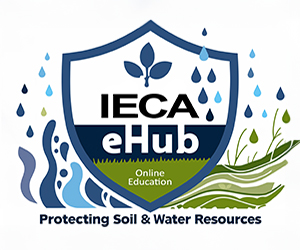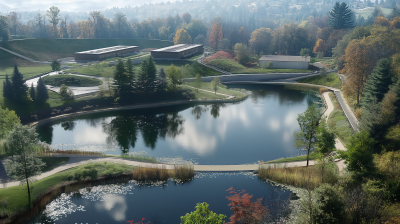
Sediment Basin Design Theory and Get Flocced
-
Register
- Non member - $40
- Professional member - $15
- Professional Plus member - Free!
- Professional Plus Org member - Free!
- Student member - $15
- Young Professional member - $15
- Emeritus member - $15
- Discounted Professional member - $15
- Australia Member - $15
- Australia Non-Member - $40
- Australasia Professional Plus - Free!
- Australasia Professional Plus Org - Free!
- Australian Student - $15
- New Zealand Member - $15
- New Zealand Professional Plus Org - Free!
- New Zealand Professional Plus - Free!
- New Zealand Student - $15
Sediment Basin Design Theory and Get Flocced

Presented by: Kyle Robson | Managing Director | Topo, Jaime Schussler | Assistant Professor | Oklahoma State University, Michael Frankcombe | Environmental Management Specialist | EMM Consulting, Richard McLaughlin, Ph.D. and Chris Wilcox | Senior Environmental Advisor | HEB Construction
Level: Intermediate
Duration: 3 hours
Type of Course: On-Demand
Sediment Basin Design in Australia and the USA
The Recent Evolution of Sediment Basin Design in Australia: Presented by Kyle Robson
In 2018 the Australasian Sector of the International Erosion Control Association published an update to ‘Appendix B – Sediment Basins’ of their Best Practice Erosion and Sediment Control (BPESC) document. The revision detailed a significant shift in sediment basin design and operation in Australia to a flow-through approach with the aid of coagulants and flocculants adopted from our New Zealand neighbours across the ditch.
This webinar will provide an overview on what the changes are, why they have occurred, what this looks like from a design and construction perspective, and where individuals or companies can find resources to help them transition designs to comply with the BPESC document. Although this session focuses on Australian practices, it may also be beneficial to other regions who could benefit from improved sediment capture approaches that have been adopted for a vast number of years in New Zealand and now in Australia.
Sediment Basin Design Specifications, Science and Standards in United States of America: Presented by Jaime Schussler
In the U.S., sediment basins are typically employed along the edge of disturbed watersheds to detain stormwater runoff and capture sediment by providing storage to promote gravitational sedimentation thereby reducing offsite sediment discharge. Sediment basins act as a final opportunity to capture sediment laden discharge prior to leaving the site. Are our sediment basins designed to handle this sort of load? The answer- some basins are, and some are not. Design specifications and adequacy vary from state to state. This presentation will cover a wide range of commonly implemented sediment basin design specifications, sediment basin performance evaluations and science-based design, and recap the recently developed IECA Sediment Basin Design Standard.
__________________________________________________________________________________________
"Get Flocced" presentation and International Panel Discussion
"Get Flocced" - The Coagulation and Flocculation Process for Dirty Water Treatment: Presented by Michael Frankcombe
International Panel Discussion on the Use of Flocculants

Course Last Reviewed: June 2024
Hosted by:

Platinum Event Sponsor

Daily sponsor

Sponsorship opportunities are available! Contact sandra@ieca.org or kim@ieca.org to learn more.
Kyle Robson
Managing Director
Topo
Kyle is recognised as a specialist and thought leader in the field of erosion and sediment control in Australia and has been involved in some of the largest projects in Australia, as well as policy and industry guideline preparation. Kyle is a Registered Professional Engineer of Queensland (RPEQ), Certified Professional in Erosion and Sediment Control (CPESC) and is a past Director of the Australasian Sector of the International Erosion Control Association (IECA).
Jaime Schussler, M.S., CPESC-IT
Assistant Professor
Oklahoma State University
Dr. Jaime Schussler is an assistant professor in the School of Civil and Environmental Engineering at Oklahoma State University. Dr. Schussler’s research focuses on stormwater management, specializing in erosion and sediment control. Her work aims to find implementable solutions to manage increased stormwater runoff and sediment loads from construction, urban, agricultural, and reclamation sites. Her experience extends to surface water hydrology, water resources engineering, and surface water quality.
Michael Frankcombe
Environmental Management Specialist
EMM Consulting
Michael is an environmental management specialist with more 30 years’ practical experience in the civil construction, mining, and pipeline industries. He has been a Director of the Australasian Chapter of IECA for approximately 20 years, was President for 14 years and Technical Vice President of R1 prior to Regionalisation for three years. He is a CPEC (No.1351) and is Co-chair of Technical Committee for Envirocert Int.
Michael specialises in erosion and sediment control, landform design, rehabilitation, revegetation, natural channel design and water treatment. He is recognised nationally and internationally as a soil conservation specialist. He has presented many papers on erosion and sediment control and rehabilitation in Australia, New Zealand, the Philippines and the USA. He has also presented numerous field days on revegetation practices, creek rehabilitation, erosion and sediment control and turbid water treatment.
Michael has also provided erosion and sediment control expert witness services to NSW and Qld Government Agencies, Local Governments, private companies and NGO’s and has a track record of developing practical and workable solutions where others fail using quality science to develop informed solutions.
Richard McLaughlin, Ph.D.
Raised in Maryland, Dr. McLaughlin attended Virginia Tech for his undergraduate degree in Natural Resource Management. He then studied forestry, soils and soil chemistry at Purdue for his Master's and Ph.D. After 2 years as a post-doctoral researcher at North Carolina State University, he was hired by Ciba-Geigy in Greensboro as a Senior Scientist. After five years of excellent pay and benefits, he returned to NC State in 1993 to conduct applied research and extension education in water pollution prevention. His group has conducted extensive research into improved methods of erosion, sediment, and turbidity control and has trained thousands in standard and advanced practices on construction sites. His Outreach program received the 2010 Education Award from the International Erosion Control Association and his research program received the Applied Research Award from the Soil Science Society of America in 2011.
Chris Wilcox
Senior Environmental Advisor
HEB Construction
Dr Christopher Wilcox is a senior environmental advisor for HEB construction, a tier 1 construction company in New Zealand where he has been in the earthwork and construction industry for the last 5 years. Chris earned a PhD in chemistry from the University of Auckland in 2019 focussing on antimicrobial polymers, which has very little to do with the role he now finds himself but has allowed him to quickly learn, understand and specialise in the role of water treatment chemicals on site contaminated water and runoff. Day to day he is involved in providing environmental support to HEB’s projects in the Auckland region, including civil and land development projects through to structures such as bridges and large roading infrastructure. Chris enjoys spending his free time with his wife and three young children.
You will receive 1.5 Professional Development Hours for each webinar in this series. A total of 3 Professional Development Hours are available for this program.



